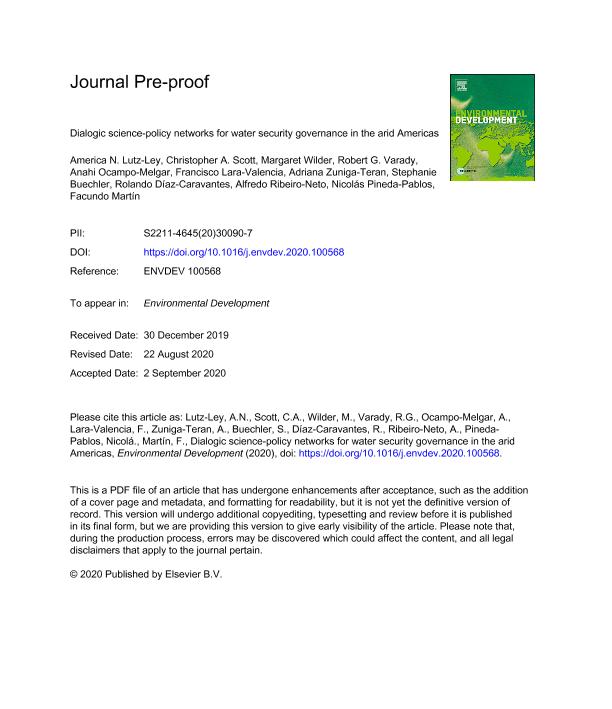Mostrar el registro sencillo del ítem
dc.contributor.author
Lutz Ley, America N.
dc.contributor.author
Scott, Christopher A.
dc.contributor.author
Wilder, Margaret
dc.contributor.author
Varady, Robert G.
dc.contributor.author
Ocampo Melgar, Anahi
dc.contributor.author
Lara Valencia, Francisco
dc.contributor.author
Zuniga Teran, Adriana
dc.contributor.author
Buechler, Stephanie
dc.contributor.author
Díaz Caravantes, Rolando
dc.contributor.author
Ribeiro Neto, Alfredo
dc.contributor.author
Pineda Pablos, Nicólas
dc.contributor.author
Martin, Facundo Damian

dc.date.available
2021-09-30T11:33:37Z
dc.date.issued
2020-09
dc.identifier.citation
Lutz Ley, America N.; Scott, Christopher A.; Wilder, Margaret; Varady, Robert G.; Ocampo Melgar, Anahi; et al.; Dialogic science-policy networks for water security governance in the arid Americas; Science Direct; Environmental Development; 35; 9-2020; 1-14
dc.identifier.issn
2211-4645
dc.identifier.uri
http://hdl.handle.net/11336/142015
dc.description.abstract
Addressing wicked problems challenging water security requires participation from multiple stakeholders, often with conflicting visions, complicating the attainment of water-security goals and heightening the need for integrative and effective science-policy interfaces. Sustained multi-stakeholder dialogues within science-policy networks can improve adaptive governance and water system resilience. This paper describes what we define as “dialogic science-policy networks,” or interactions -- both in structural and procedural terms -- between scientists and policy-makers that are: 1) interdisciplinary, 2) international (here, inter-American), 3) cross-sectoral, 4) open, 5) continual and iterative in the long-term, and 6) flexible. By fostering these types of interactions, dialogic networks achieve what we call the 4-I criteria for effective science-policy dialogues: inclusivity, involvement, interaction, and influence. Here we present several water-security research and action projects where some of these attributes may be present. Among these, a more comprehensive form of a dialogic network was intentionally created via AQUASEC, a virtual center and network initially fostered by a series of grants from the Inter-American Institute for Global Change Research. Subsequently, AQUASEC has significantly expanded to other regions through direct linkages and additional program support for the International Water Security Network, supported by Lloyd's Register Foundation and other sources. This paper highlights major scientific and policy achievements of a notable suite of science-policy networks, shared practices, methods, and knowledge integrating science and policy, as well as the main barriers overcome in network development. An important gap that remains for future research is the assessment and evaluation of dialogic science-policy networks' long-term outcomes.
dc.format
application/pdf
dc.language.iso
eng
dc.publisher
Science Direct
dc.rights
info:eu-repo/semantics/openAccess
dc.rights.uri
https://creativecommons.org/licenses/by-nc-nd/2.5/ar/
dc.subject
WATER SECURITY
dc.subject
WICKED WATER PROBLEMS
dc.subject
SCIENCE-POLICY DIALOGUES
dc.subject
DIALOGIC SCIENCE-POLICY NETWORKS
dc.subject
ARID AMERICAS
dc.subject.classification
Ciencias Medioambientales

dc.subject.classification
Geografía Económica y Social

dc.subject.classification
CIENCIAS SOCIALES

dc.title
Dialogic science-policy networks for water security governance in the arid Americas
dc.type
info:eu-repo/semantics/article
dc.type
info:ar-repo/semantics/artículo
dc.type
info:eu-repo/semantics/publishedVersion
dc.date.updated
2021-08-20T19:55:47Z
dc.journal.volume
35
dc.journal.pagination
1-14
dc.journal.pais
Reino Unido

dc.journal.ciudad
Londres
dc.description.fil
Fil: Lutz Ley, America N.. El Colegio de Sonora; México
dc.description.fil
Fil: Scott, Christopher A.. University of Arizona; Estados Unidos
dc.description.fil
Fil: Wilder, Margaret. University of Arizona; Estados Unidos
dc.description.fil
Fil: Varady, Robert G.. University of Arizona; Estados Unidos
dc.description.fil
Fil: Ocampo Melgar, Anahi. Universidad de Chile.; Chile
dc.description.fil
Fil: Lara Valencia, Francisco. Arizona State University; Estados Unidos
dc.description.fil
Fil: Zuniga Teran, Adriana. University of Arizona; Estados Unidos
dc.description.fil
Fil: Buechler, Stephanie. University of Arizona; Estados Unidos
dc.description.fil
Fil: Díaz Caravantes, Rolando. El Colegio de Sonora; México
dc.description.fil
Fil: Ribeiro Neto, Alfredo. El Colegio de Sonora; México
dc.description.fil
Fil: Pineda Pablos, Nicólas. El Colegio de Sonora; México
dc.description.fil
Fil: Martin, Facundo Damian. Consejo Nacional de Investigaciones Científicas y Técnicas. Centro Científico Tecnológico Conicet - Mendoza. Instituto de Ciencias Humanas, Sociales y Ambientales; Argentina
dc.journal.title
Environmental Development
dc.relation.alternativeid
info:eu-repo/semantics/altIdentifier/url/https://linkinghub.elsevier.com/retrieve/pii/S2211464520300907
dc.relation.alternativeid
info:eu-repo/semantics/altIdentifier/doi/http://dx.doi.org/10.1016/j.envdev.2020.100568
Archivos asociados
